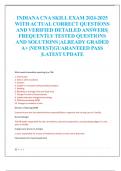Exam (elaborations)
INDIANA CNA SKILL EXAM WITH ACTUAL CORRECT QUESTIONS AND VERIFIED DETAILED ANSWERS| FREQUENTLY TESTED QUESTIONS AND SOLUTIONS |ALREADY GRADED A+ |NEWEST|GUARANTEED PASS |LATEST UPDATE
- Course
- Institution
INDIANA CNA SKILL EXAM WITH ACTUAL CORRECT QUESTIONS AND VERIFIED DETAILED ANSWERS| FREQUENTLY TESTED QUESTIONS AND SOLUTIONS |ALREADY GRADED A+ |NEWEST|GUARANTEED PASS |LATEST UPDATE
[Show more]



